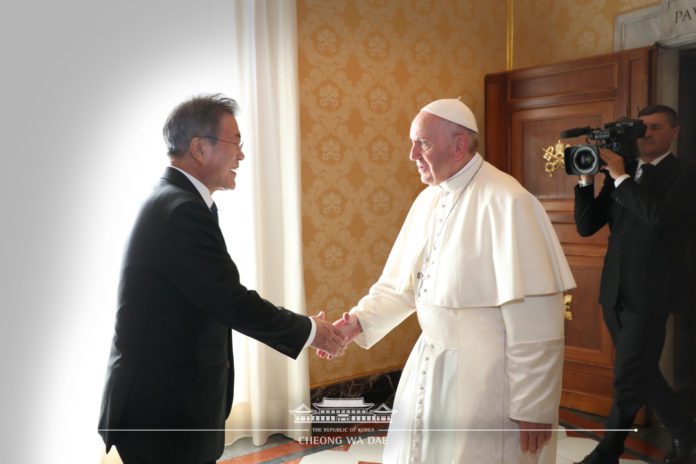President is growing desperate for progress on diplomacy
South Korean President Moon Jae-in’s focus for the G20 in Italy this week appears to be North Korea, rather than pressing global economic issues, as he plans to visit the Pope to discuss a possible visit to Pyongyang.
Moon is planning to meet Pope Francis on October 29. Moon had previously asked the Pope to visit North Korea, while the Pope reportedly said he is willing to do so someday. International human rights experts argued that the Pope’s visit could be misused politically to legitimize the North Korean dictatorship.
The presidential Blue House’s spokesperson Park Soo-hyun declined to give a direct answer to the question of whether the Pope’s visit to North Korea has been already coordinated in advance. He said on a radio show Thursday that “this is a diplomatic issue between North Korea and the Vatican.”
Then Park added that “however, a meeting with the Pope, who has had a strong will to visit North Korea and an interest in peace on the Korean Peninsula, would really be helpful in drawing international consensus on the issue of peace on the peninsula.”
When asked about the possibility of the Pope visiting North Korea, Park replied, “I hope with all the people that the possibility goes above the 1 percent level.” He said this is something that “all South Koreans have yearned for.”
In addition to this, the South Korean media reported that Moon and the Pope would discuss visiting North Korea, according to an unnamed source.
However, international human rights and foreign relations experts told Voice of America (VOA) that the Pope’s visit is unrealistic and could be portrayed as a political move that legitimizes North Korea’s dictatorship.
Ambassador Robert King, who served as the United States special envoy for North Korean Human Rights Issues, told the VOA that “I doubt it will have much influence on Kim Jong-un.” He added, “What a papal visit would do for Kim Jong-un would give him status and prestige and attention, and that would be something that he [Kim] would be very happy to have.”
Greg Scarlatoiu, the Executive Director of the Committee for Human Rights in North Korea (HRNK) in Washington D.C., asked what the Pope would do in a country where Christians are persecuted.
“If the Pope visits Pyongyang, would he have to officiate a mass?” Scarlatoiu asked. “Would other priests have to officiate mass in Pyongyang? They have pretended as Catholic priests, but they’re not real Catholics.” Scarlatoiu added that “a Catholic priest cannot give Holy Communion to a pretend Catholic, especially a pretend Catholic priest.”
“So there are multiple issues on all levels. And for this reason, I think that the papal visit is not going to take place,” Scarlatoiu explained. He said there were cases where the Pope met with human rights violators, but “none of them were on par with the North Korean regime.”
Mitchell Reiss, former Director of Policy Planning at the State Department, told the VOA that it would be unrealistic to expect the Pope to be able to broker any agreements that currently divide the North and South. “Hope is not a policy,” he said. “Declaring an end to the Korean War without fundamentally changing any of the underlying tensions and disagreements would be like applying a band aid to a cancer patient.”
However, Reiss expected that the Pope’s visit could have a positive impact if the purpose of the visit is focused on religion instead of politics.
“It would be a very special event if the Pope was to visit North Korea, especially for all those in the North who still practice the Christian faith,” he said. “Beyond the religious significance of the visit, the greater impact may be the global crush of media that would accompany the Pope into and around North Korea, showing the world the living conditions there and allowing at least some of the North Korean people some interaction with the outside world.”
Scarlatoiu warned of the Pope being used by President Moon for political gain. “The Pope’s advisors will understand that President Moon Jae-in is desperate, presidential elections are approaching fast, and there is no need for the Pope to present President Moon and his party with an unconditional gift of this nature—an unconditional papal visit to North Korea that is, once again, a regime that oppresses Christians of any faith in any denomination.”
The presidential Blue House also said that a summit with U.S. President Joe Biden is not scheduled but they can still meet on the sidelines to discuss an end-of-war declaration. Many conservatives in South Korea are concerned that the outgoing president could make a deal that cannot be kept once he loses power. This was the case in 2007 when former President Roh Moo-hyun met with then-North Korean dictator Kim Jong-il just two months before the election and signed a controversial declaration of pledging peace.
Meanwhile, the South Korean National Intelligence Service told the National Assembly’s intelligence committee members on October 28 that North Korea demanded the suspension of joint military exercises with the United States as a precondition of an end-of-war declaration. It was reported that the North also demanded easing sanctions on exporting minerals and importing oil as other prerequisites.
These conditions make an already unlikely plan even more unlikely.


